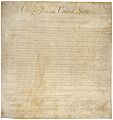Eighth Amendment to the United States Constitution facts for kids
The Eighth Amendment (also called Amendment VIII) is an important part of the United States Bill of Rights. It was approved on December 15, 1791. This amendment protects people from unfair treatment by the government when they are accused or convicted of a crime.
It has three main parts:
- It stops courts from asking for too much bail (money to guarantee someone shows up for court).
- It prevents governments from charging too-high fines.
- Most importantly, it says that "cruel and unusual punishments" cannot be used.
The Eighth Amendment mostly applies to criminal cases, not to civil (non-criminal) disagreements.
Contents
What the Amendment Says
"Excessive bail shall not be required, nor excessive fines imposed, nor cruel and unusual punishments inflicted."
This means the government can't ask for too much money for bail, charge huge fines, or give out punishments that are too harsh or unusual.
Why We Have This Amendment
The ideas in the Eighth Amendment come from the English Bill of Rights 1689. This older document was created after a famous case involving a man named Titus Oates. Oates told many lies in court, which led to innocent people being executed.
When Oates was punished, his sentences were very harsh and brutal, even though they were "ordinary" punishments at the time. He was put in prison and later, after a new king took over, he was tried again for lying under oath. His new sentence included being whipped through the streets of London five days a year for the rest of his life, in addition to life in prison.
Because of cases like Oates', the English Bill of Rights said that cruel and unusual punishments should not be used. Later, in 1776, the American Virginia Declaration of Rights used similar words. This idea was then added to the U.S. Constitution as the Eighth Amendment.
Understanding Excessive Bail
Bail is money, property, or a promise that a person accused of a crime gives to the court. It's a guarantee that they will show up for their trial. If they come to court, they get their bail back. If they don't show up, the court keeps the bail, and the person might face more problems.
When a judge decides how much bail to set, they look at several things:
- How serious the crime is.
- How much evidence there is against the person.
- How connected the person is to their community (like having a job or family there).
- If the person can actually pay the bail amount.
- How likely it is the person might try to run away and not come to trial.
Everyone is considered innocent until proven guilty. Setting bail too high would keep people in jail before their trial, making it hard for them to live their lives or support their families.
Limiting Excessive Fines
This part of the amendment stops the government from setting fines that are too large. A fine is money paid as a punishment for breaking a rule or law. The amount of the fine must fit the seriousness of the offense. If a fine is way too big for the crime committed, it goes against this amendment.
In 1993, the Supreme Court of the United States decided in a case called Austin v. United States that this rule about fines also applies to civil cases, not just criminal ones.
Preventing Cruel and Unusual Punishments
The idea of "cruel and unusual punishments" was first written down in the English Bill of Rights in 1689. In America, George Mason added it to the Virginia Declaration of Rights in 1776. Then, in 1791, it became a main part of the Eighth Amendment.
People like Patrick Henry strongly believed that this rule should be in the Bill of Rights. They worried that without it, the new federal government might use very harsh methods, like torture, to force people to confess to crimes. At that time, some countries like Spain, France, and Germany still used torture. Americans wanted to make sure their new government would not follow such examples. Because of these strong arguments, this important protection was added to the Eighth Amendment.
Images for kids
-
The original Bill of Rights document, kept at the National Archives and Records Administration.
See also
 In Spanish: Octava Enmienda a la Constitución de los Estados Unidos para niños
In Spanish: Octava Enmienda a la Constitución de los Estados Unidos para niños
 | Roy Wilkins |
 | John Lewis |
 | Linda Carol Brown |


